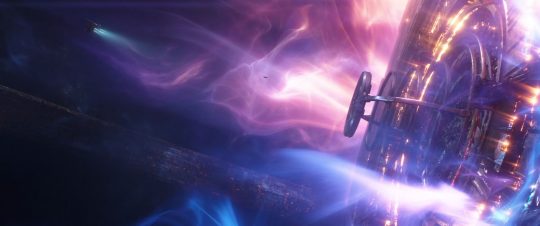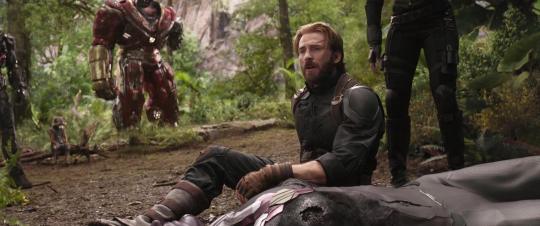#in other news apparently 'killing his mother' is where ross draws the line
Explore tagged Tumblr posts
Text
Last line tag
I was tagged by @winterandwords and for ONCE (keep the fireworks and trumpets in check) I will do it instantly.
Also for once, the actual last lines in my doc:
“Would you stop me?” she whispered. “I can’t stop you.” It was an answer. It wasn’t the one she had hoped for.
Tagging @pleasestaywithmedarling and @starlit-hopes-and-dreams because I wanna know what you two are up to >_>
#salad-tag#Last line tag#wip: aool#in other news apparently 'killing his mother' is where ross draws the line
11 notes
·
View notes
Text
Marvel Cinematic Universe: Avengers: Infinity War (2018)

Does it pass the Bechdel Test?
Yes, once.
How many female characters (with names and lines) are there?
Nine (25.71% of cast).
How many male characters (with names and lines) are there?
Twenty-six.
Positive Content Rating:
Three.
General Film Quality:
For a movie which is pretty much wall-to-wall fight scenes...I love it. I always start out going ‘maybe I overrate this movie, maybe it’s not as good as I remember’, but by the end, I’m right back in there.
MORE INFO (and potential spoilers) UNDER THE CUT:
Passing the Bechdel:
Wanda apologises to Natasha for lying. It’s a close call.

Female characters:
Pepper Potts.
F.R.I.D.A.Y
Gamora.
Mantis.
Wanda Maximoff.
Natasha Romanoff.
Okoye.
Nebula.
Shuri.
Male characters:
Ebony Maw.
Thanos.
Thor.
Loki.
Heimdall.
Bruce Banner.
Stephen Strange.
Wong.
Tony Stark.
Peter Parker.
Ned.
Peter Quill.
Rocket.
Drax.
Groot.
Vision.
Steve Rogers.
Sam Wilson.
The Collector.
Thaddeus Ross.
James Rhodes.
T’Challa.
Bucky Barnes.
Eitri.
Red Skull.
M’Baku.
OTHER NOTES:
Heimdall had proven himself too much of an MVP in previous films to be allowed to live in this one. Bastards.

Heimdall and Loki, both dead before the opening titles. That’s how you know this movie means business, it’s not faking at high stakes.
I also am from space and have come here to steal a necklace from a wizard.
“Mr Stark, it smells like a new car in here!”

“All words are made up.”
Not gonna lie, when I saw this at the cinema and I realised that Captain America had arrived? My heart LEAPT. It was intense.

Depressed Thor is a great touch - after all previous films with Thor had him so bland, and then Ragnarok made him funny but essentially glossed over any of the difficult emotions it was dredging up, I’m glad to finally get something real and meaty from the character. If characters go through all manner of Hell and don’t show any signs of labouring under that weight, you’re doing character development wrong.
Nice callback with Red Skull.
The sacrifice of Gamora on Vormir is a really well-balanced piece; it was asking a lot, to make the emotion of it land despite how little of Thanos we’ve seen before, and without genuine emotion at it’s core it’s just the killing off of a female character for shock value. I feel like they got the pitch just right (most thanks to the music).
As much as I enjoy Thor and Rocket’s bantering, the side-quest for Stormbreaker feels like an unnecessary and over-the-top distraction in an already stuffed-full film. Easily the weakest part of the plot.

The fact that Quill fucks everything up with defeating Thanos on Titan because he can’t keep himself under control for two seconds certainly does not endear him to me in the slightest. Like ok, you’re upset, but if you can’t stop yourself from getting violent that’s on you, that makes you a dangerous person with serious issues, that’s not normal and it’s not ok. Also, literally half of all life in the universe was at stake. So there’s that.
Listen, I’m very susceptible to heroism (and that’s why superhero movies work for me), so every time someone comes to someone else’s rescue, I have feelings.
I had convinced myself that somehow, Thanos wouldn’t succeed with his whole plan in this movie, that he would get all the stones but that he would like, go to a special place or something before enacting his plan, so that the good guys would have a chance to regroup and race to stop him before it was too late, all that jazz. So (even though Thanos had already snapped at that point), when Bucky Barnes disintegrated before our very eyes, I was SHOCKED. That got me like a smack in the face.

Considering I’ve never really been a fan of Tom Holland’s Spider-man, it’s a credit to his work that Peter’s death scene is so effective. That’s acting.

So, what makes this movie work despite being so heavy with bombastic action? The short answer is: it’s because the good guys lose. I’ve made no secret of being a fan of the ‘hour darkest before the dawn’ in storytelling, so this is playing to the sweet spot for me there, but it’s not as simple as just making everything miserable and hopeless. In this case, specifically, the lead-up to that ultimate failure is key; it’s gotta still feel like a superhero extravaganza, even as it takes an increasingly dark turn. The action works because it’s part of what we signed up for (the best camouflage for subversions of the traditional model), and it works because it’s all carrying the story forward - the Infinity War is comprised of multiple battles, and because of the way the pieces of the narrative are separated, the characters don’t know how any of the other battles are turning out; everyone is just trying to fight what’s in front of them and defend the stone in their midst, they don’t have the option to sit around doom-and-glooming and restrategising as news of each defeat comes in. Rather than dragging us wholesale from Point A to B to C in ever-escalating stakes and complications, the writers have had the good sense to spread things out and let things fall apart for our heroes (and the universe) in multiple smaller pieces until they reach a cumulative critical mass. Consequently, instead of feeling as though we’re sitting there watching things go from bad to worse, the audience forms this false sense of security in the action; it’s a superhero movie, after all. We expect them to work it all out in the end, to build toward a moment of apparent hopelessness (a darkest hour before the dawn), and then to rally triumphantly for the big win. As such, we perceive small victories (i.e. the defeat of Thanos’ various ‘children’, the creation of Stormbreaker, the way things draw out in the battle on Titan) as if they are more significant, as if they are signs leading us to that big win; without those small, expected victories, the ultimate failure would not hit as hard, because after two and a half hours of watching the good guys get wrecked without a chance, what surprise would there be in the snap?

Of course, plenty of viewers knew about the snap already or expected an ultimate failure of some sort based on the fact that we pretty much all knew that this was the first half of our grand Avengers finale (my mother, who is not a superhero movie fan, did not know what she was getting into and was...very shocked), so it’s important that the film still works to engage us on a character level so that the good guys losing in the end can hit like a ton of bricks even if you knew it was coming (and even though you no doubt expected to get the big win eventually, once Endgame came out). After all the fighting and the bantering, all the usual stuff we expect to see our heroes go through in the course of an average adventure, having them then watch their beloved friends/allies/whatever literally disintegrate before their eyes in a quiet, drawn out scene of devastation is a magnificent piece of cinema, communicating the shock not only of the event itself, but of the complete disruption to the superhero status quo. It’s not just that good guys don’t lose like this, it’s that they don’t lose with a whimper instead of a a bang. It’s not only that the cost of failure has never been this high; it’s also that they have never been forced to watch it play out with such inevitability; they have never before been rendered so powerless. If the entire film had the tone of the last ten minutes, it wouldn’t work so well, it’d just be a drudge and the audience would be desensitised by the end. By the same token, if the rest of the film had not planted the seeds of the finale so thoroughly in all its smaller losses and smokescreen victories, the ending would not be so horrifically fitting.

Neither, of course, would the ending be so affecting, if we were not as attached to the characters as we are. We have many, many films worth of history with most of them, or at least one solid encounter in which to become attached, and even in a movie chock-full of more characters than any other before, everyone gets a chance to show their personality and remind us why we care if they live or die. I’m not going to argue for this being an incredible character piece (nor is it pretending to be one), but it plays its very large hand very well, putting emphasis where it needs to be without overloading or unbalancing the story. As I noted above, I was particularly impressed with the way Thanos was handled, considering our exposure to him previously was very minimal and it was left up the this film to build his ethos as well as his relationships with his ‘children’ almost from scratch, creating complexity and simplicity without falling into the trap of trying to make the villain sympathetic; Thanos isn’t necessarily relatable (nor does he need to be), but he is understandable in that we’ve all probably encountered at least one person who holds the same limited worldview and is somehow convinced that they could ‘fix’ everything, given the power. Thanos isn’t actually aiming for universal domination in the traditional sense, and it makes him more disturbing and more realistic as a villain, because his evil is not nebulous or purely self-serving; he is a true believer, and his delusions have an all-too-familiar ring about them, so as we watch him lumber and pontificate around the story, we get a clearly-drawn image of someone possessed of such basic and humble flaws that he is - again, without being treated as sympathetic - quite significantly humanised, despite all of the non-human elements that make up both his character, and his situation. Even as it planet-hops and draws upon cosmic magic, the narrative is grounded by a centrepiece of plain, ungodly fallibility.

Now, I recognise that in all of this praise for the way this film was executed, there isn't really anything to be said for it regarding the purpose of this blog; on the female representation front, it's not really doing anything (the fact that it juuust manages to pass the Bechdel and juuust over a quarter of its cast is female does not win it brownie points; its better than not having either of those things, but that's not a genuine achievement). The two female characters who were more prominently positioned in this movie are Gamora and Wanda; Gamora largely in context of her relationship with Thanos, and Wanda as Vision’s significant other and the means of his destruction. Notably, both women’s arcs are accessories to the arcs of male characters, which is not what we’re aiming for in good representation, though it does not exclude the possibility of quality content; Gamora’s role may have a lot to do with Thanos (not least, after he kills her), but it is still distinctly her own story, rich with emotion and coming to a surprising and depressing end which I felt struck the right chords to be compelling rather than an enraging disposal of one of the few female characters around (more on this after Endgame). Wanda’s presence leaves less of an impression, in terms of screen time, plot complication, and audience engagement, but all things considered I don’t think that was a terrible choice; Wanda and Vision’s relationship had been a somewhat sparse subplot in previous films and the chemistry was not strong, so I don’t think it would have been to the film’s benefit to try and expand on that relationship further than they did. As it was, there was enough there to sell the emotion, and nothing extraneous, and as much as I enjoy this movie, I wish I could say better things for its female representation than that. It is stuffed-full, and definitely not perfect, and space could have been made to pump up some of the other female characters’ roles more (the Earthbound characters get the least attention in the movie, and since basically all my faves are there it is a testament to how well this movie works for me that I enjoy it so much anyway, but a little more attention there would not have gone astray, especially since that’s where most of the female cast is). That said...I still really enjoy it, man. As far as popcorn action goes, this is top shelf.

4 notes
·
View notes
Text
Highly Recommended: Pastry Murder Mysteries
Murder-as-entertainment was never my thing. Having spent a short chapter of my life working on a true-crime television show that resulted in daily calls to my mom to tell her I loved her, I’m not one to rush towards grisly Netflix docs or podcasts about someone’s favorite murders. But one afternoon while waiting in the checkout line at a grocery store, I noticed an ad on the conveyor belt divider for the newest book by Joanne Fluke, a New York Times bestselling author who apparently holds the much-coveted title of “Queen of Culinary Capers.”
The book was called Raspberry Danish Murder, a title that, given my tendency to request the dessert menu at the start of every restaurant meal I partake in, instantly caught my attention. As it turns out, Raspberry Danish Murder, which was released in February of this year, is the 22nd (!) book in an ongoing series surrounding a fictitious bakery owner/detective named Hannah Swensen. Each installment features a new murder for Hannah to solve, along with at least a dozen recipes for baked goods and (an occasional) savory dish, each mentioned somewhere in the story. The most accurate way to describe these books might be “cookbooks with smatterings of fiction woven in” — which is precisely why they’re my favorite guilty-pleasure reading material.
The protagonist, Hannah, is a red-headed 20- or 30-something (depending on how far along in the series you are) living in the fictional small town of Lake Eden, Minnesota. She lives with her giant orange cat, Moishe, is very close with her mother and sisters, and, despite being an innocent bakery owner, manages to find herself entangled in multiple murders each calendar year. Don’t be fooled by the seemingly macabre elements — they’re about as scary as Dr. Seuss stories, complete with a small-town setting that adds a dose of provincial charm. Hannah knows everyone in town by name (in addition to their favorite sweet treat), and her bakery, the Cookie Jar, acts as a community meeting place for Lake Eden’s locals. Murder might be what excites the town, but Swensen’s desserts are what unite it.
The Hannah Swensen series belongs to the “cozy mysteries” genre, books that downplay the graphic violence or overt noir often found in other mysteries. “The heart of why readers love cozies is they know what they are getting,” mystery writer Amanda Flower wrote in Publisher’s Weekly earlier this year. “The cozy lesson is an average person can make a difference. It doesn’t matter if the protagonist is a knitter, a librarian, or a gardener — that person can solve a murder.” (The genre also extends beyond books — Hallmark produced five made-for-television films based on Fluke’s series, with former soap star and The Biggest Loser host Alison Sweeney starring as Hannah.) Part of the appeal of the pastry murder mystery series is the element of reader interaction: Clues surrounding the murders are scattered throughout, a la Encyclopedia Brown. Plus, there’s no need to get sad when someone gets killed off because they were likely a minor character with an offensive personality trait. In fact, the prospect of Hannah burning her cookies stresses me out more than the criminal activity itself.
Hannah’s desserts, of course, are actually Fluke’s recipes, which, as she told the New York Times in 2017, come from her own kitchen experiments, her family’s recipe books, and from fans. The featured recipes often have nothing to do with the actual plot line of a book — for instance, a quick reference to deep-fried candy bars made during a visit to the county fair in Key Lime Pie Murder warrants the inclusion of “Ruby’s Deep-Fried Candy Bars” in the recipe index. (That said, some of the more recent books can have as many as 20 recipes, so I can appreciate the impossibility of each one being a critical story device.) And though I haven’t yet tried my hand at any of them, they have quite a healthy digital presence — they’re featured on literary food blogs like Mysterious Eats and appear on dedicated Pinterest boards.
From a reader’s (if not a cook’s) perspective, I’m a sucker for the little modifications or suggestions the “characters” (via Fluke) insert into their recipes — some are courtesy of Hannah, and others from supporting characters in the story. The secondary character notes get thrillingly specific: In the recipe for a fruit pastry from one of Hannah’s employees, Lisa, Fluke writes: “Since pineapple is Herb’s favorite fruit, I’m going to try it with pineapple jam next, if Florence can order it at the Red Owl. I’m pretty sure that Smucker’s makes it.” Herb is Lisa’s boyfriend, and the Red Owl is the town grocery store. How can you not admire such commitment to fictitious world-creation?
There’s no need to get sad when someone gets killed off — they were likely a minor character with an offensive personality trait.
It should go without saying, but these books are not literary masterpieces. Fluke jumps at any opportunity to drop a food reference: Hannah’s truck is described as “candy apple red,” and she wears sweaters emblazoned with phrases like, “Got Cookies?” Almost every character Hannah encounters, as minor as they may be, reveals a specific relationship to food; we learn that Reverend Bob Knudson has a soft spot for Red Devil’s Food Cake (haha), while Herb Beeseman, the town marshal, is partial to Hannah’s Molasses Crackles. Even Moishe can’t escape food comparisons: “Once his whole body was stretched taut, he began to quiver like the proverbial bowl full of Jell-O.”
For the blood and guts-averse like me, it’s a blessing that the writing is straightforward and avoids gory details. Aside from (maybe) Hannah, there’s no risk of attachment to characters. Even the “good” characters are written with as much depth as a kiddie pool. Frustratingly, our heroine tends to put herself down for superficial, sexist reasons; i.e. her weight and fears of becoming a “spinster” at 30 (eye roll), though she ultimately shrugs off her insecurities in favor of consuming the baked goods she holds so dear. The food always wins in the end, which makes it marginally more tolerable, but Joanne, let’s cut this archaic nonsense moving forward, yeah?
That said, food is unquestionably the main character — the people are simply the vessels through which it’s presented and served to the reader. I find the often clunky, contrived food references to be one of the series’ most endearing qualities. “Their bakery and coffee shop, the Cookie Jar, was as empty as one of Hannah’s cream puffs before it was filled with vanilla custard,” Fluke writes in Peach Cobbler Murder. How much more delightful would life be if we started speaking in pastry-centric similes? And that’s to say nothing of the quirky wordplay, which Fluke uses to comedic effect just in case the docile nature of the books wasn’t obvious enough. In fact, puns abound throughout the cozy mystery genre at large, as evidenced by titles like: Till Death Do Us Tart; Another One Bites The Crust; Butter Safe Than Sorry: A Pennsylvania Dutch Mystery; and one that speaks to recent trends called Purrder She Wrote: A Cat Cafe Mystery.
The true beauty of these stories lies within their celebrations of pastry and sugar and excess, which is so enjoyable to read about because our own daily routines don’t typically include consuming four slices of carrot cake for breakfast. It’s harmless voyeurism at its best, too, because while the confection-laced content is entirely imaginary, it’s also entirely relatable and enviable for sugar fiends like me. With all of the rules, disappointments, and curveballs daily life throws at us, it’s comforting to escape to a world where even muffins outshine murders — and the answer to “whodunit” can be solved, easily, by a baker who just happens to be an accidental gumshoe.
Brittany Ross is a freelance writer based in New York City. Sarah Tanat-Jones is a UK-based illustrator with a love of drawing with Indian ink. Editors: Daniela Galarza and Erin DeJesus
Eater.com
The freshest news from the food world every day
By signing up, you agree to our Privacy Policy and European users agree to the data transfer policy.
Source: https://www.eater.com/2018/10/9/17934884/hannah-swensen-detective-series-joanne-fluke-murder-mystery-books
0 notes